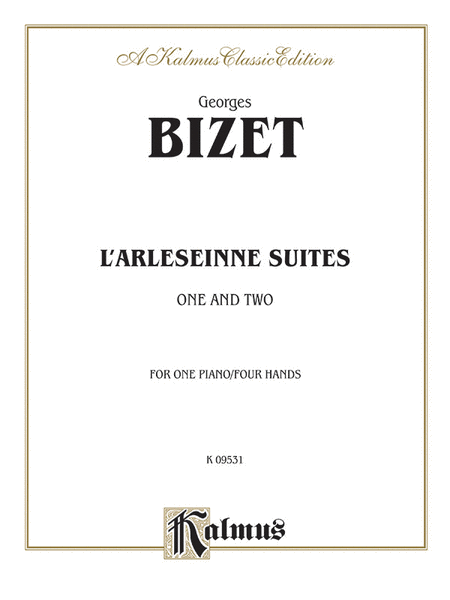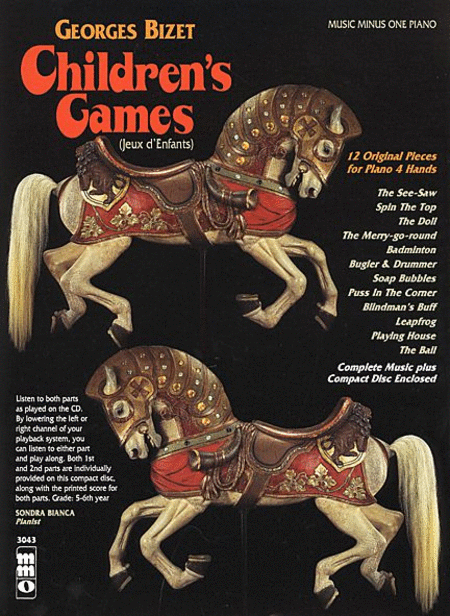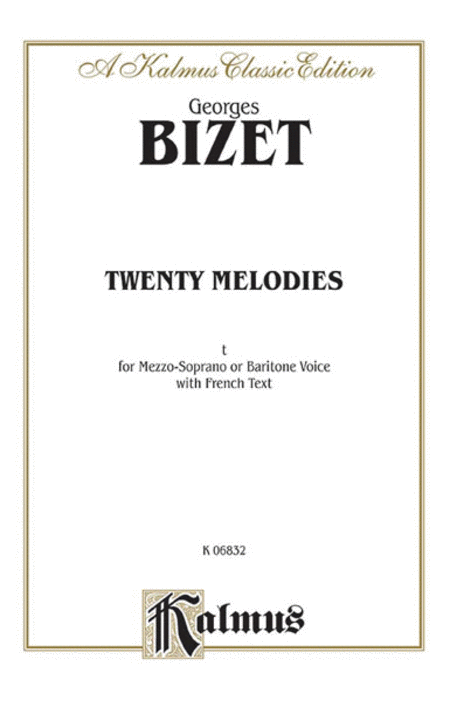Known for one of the world's most popular operas,
Carmen, Georges Bizet deserves attention as well for
other works of remarkable melodic charm. Many of his
works received cool receptions on their premieres but
are now considered central to the repertory of
classical music.
Bizet was born in Paris on October 25, 1838, and grew
up in a happy, musical family that encouraged his
talents. He learned to read music at the same time he
learned to read letters, and equally well. Entering the
Par...(+)
Known for one of the world's most popular operas,
Carmen, Georges Bizet deserves attention as well for
other works of remarkable melodic charm. Many of his
works received cool receptions on their premieres but
are now considered central to the repertory of
classical music.
Bizet was born in Paris on October 25, 1838, and grew
up in a happy, musical family that encouraged his
talents. He learned to read music at the same time he
learned to read letters, and equally well. Entering the
Paris Conservatory before he was ten, he earned first
prize in solfège within six months, a first prize in
piano in 1852, and eventually, the coveted Prix de Rome
in 1857 for his cantata Clovis et Clotilde. His
teachers had included Marmontel for piano and Halévy
for composition, but the greatest influence on him was
Charles Gounod, of whom Bizet later said "You were the
beginning of my life as an artist." Bizet himself hid
away his Symphony in C, written when he was 17, feeling
it was too much like its models, Gounod's symphonies.
The two years spent in Rome after winning his prize,
would be the only extensive time, and a greatly
impressionable one, that Bizet would spend outside of
Paris in his brief life. When he returned to Paris, he
lost confidence in his natural talents and began to
substitute dry Germanic or academic writing for his own
developing idiom. He composed a one-act opera for
production at the Opéra-Comique, but the theater's
director engaged him to write a full-length opera
instead, Les pêcheurs de perles (The Pearl Fishers).
It was not a success at the time, but despite a few
weaknesses, the work was revived in 1886, and its sheer
beauty has earned it a respected position among the
lesser-played operatic repertory. In 1863 Bizet's
father bought land outside Paris where he built two
bungalows, one of which Bizet frequently used as a
compositional retreat. He began a friendship
(apparently not a physical one) with a neighbor-woman
named Céleste Mogador, a former actress, author,
courtesan, circus rider, and dance-hall girl. She is
said to have been the model for his masterpiece's title
role of Carmen. Bizet earned his living as an
accompanist and publishing house arranger. Meanwhile,
he poured his creative efforts into an immense five-act
opera in the grand tradition, Ivan IV, but it was never
performed. This proved to be a pattern for the rest of
his career. Bizet would work hard to get an opera
produced, and even if he did, it would usually receive
only a handful of performances. Bizet's corpus of
unfinished works is large, and testifies to his
unsettled existence and his difficulty in finding a
place in France's notoriously hierarchical and
conservative musical world. In 1869 Bizet married
Geneviève Halévy, daughter of his teacher. The
marriage did not turn out to be a happy one, primarily
due to her family's history of mental illness. In 1872,
The reception history of Georges Bizet's final dramatic
work, Carmen, is rife with ironies. Although almost
unanimously condemned by Parisian critics after its
first performances in 1875 for its overt sexuality and
graphic final scene, Carmen intrigued a number of
sophisticated minds and ultimately reached the public
in a way that perhaps no other opera has. Bizet's aim
in composing Carmen had been to transform the flaccid,
moralistic bourgeois genre of opéra comique into a
more sophisticated type of staged work. With a libretto
by Ludovic Halévy and Henri Meilhac, Carmen survives
in no single authoritative version despite its enormous
popularity and influence. Guiraud converted the
original sections of spoken dialogue into recitative
for the 1875 Vienna performances. In recent years the
original version has made a striking comeback, and one
can argue that it is far more telling dramatically than
the traditional version with the recitatives. There is
also a popular orchestral suite drawn from the opera,
and several violin and piano fantasies on its themes
also exist. Carmen is cornerstone item in any opera
collection. It is ironic that Bizet composed one of
music's most evocative landscapes of Spain without ever
having been there.
Source: AllMusic:
(https://www.allmusic.com/composition/carmen-opera-mc00
02356550).
Although originally written for Orchestra, I created
this arrangement of the Habanera from Carmen (Suite 1
Act 1 No. 5) for String Quartet (2 Violins, Viola &
Cello).











 , 21 Jan 2024 at 23:40
, 21 Jan 2024 at 23:40 
